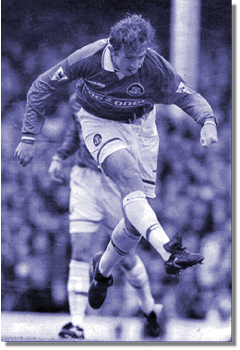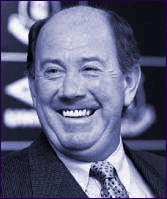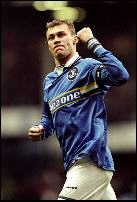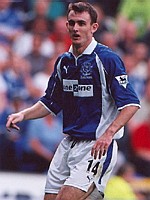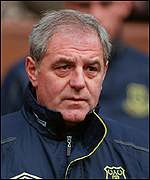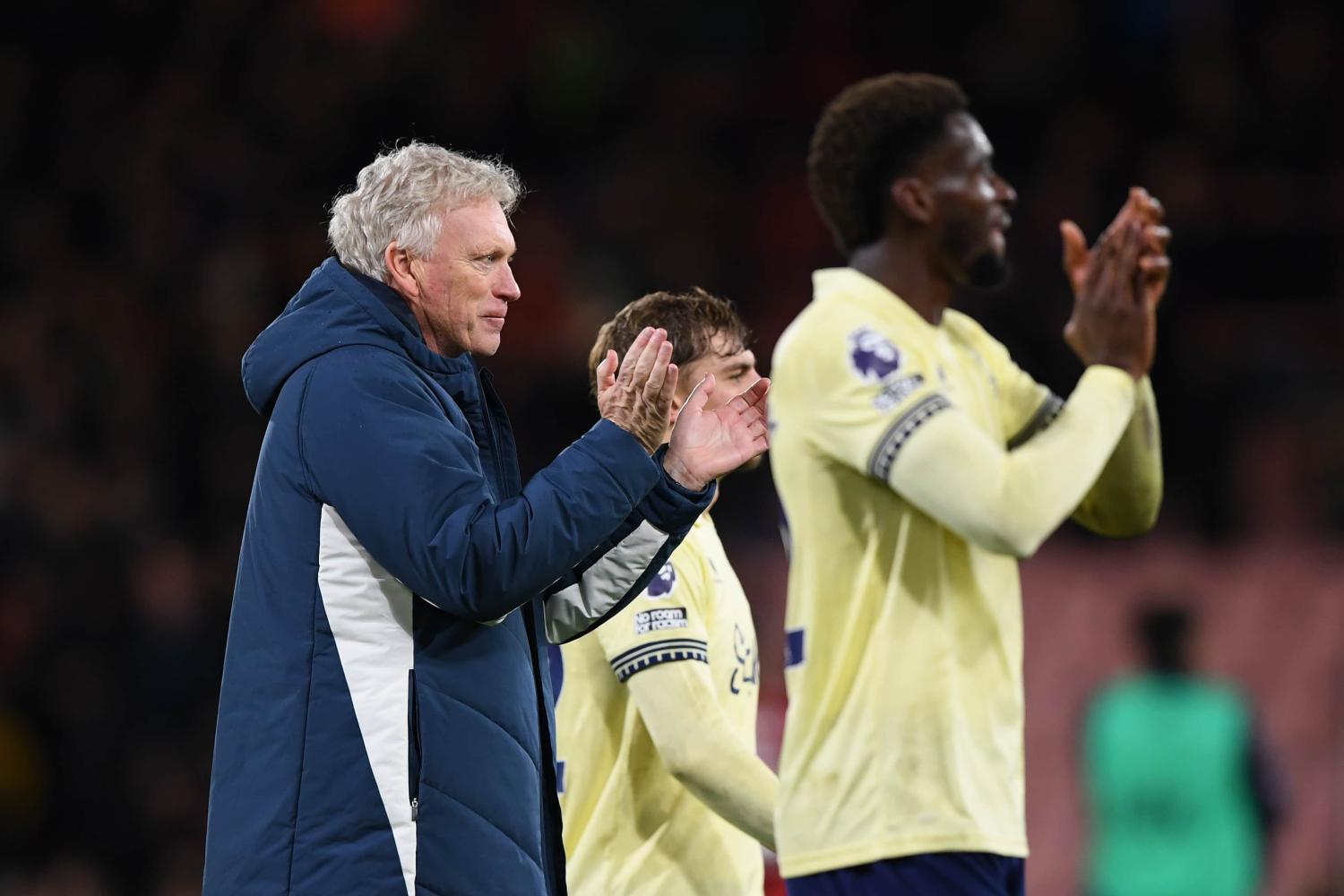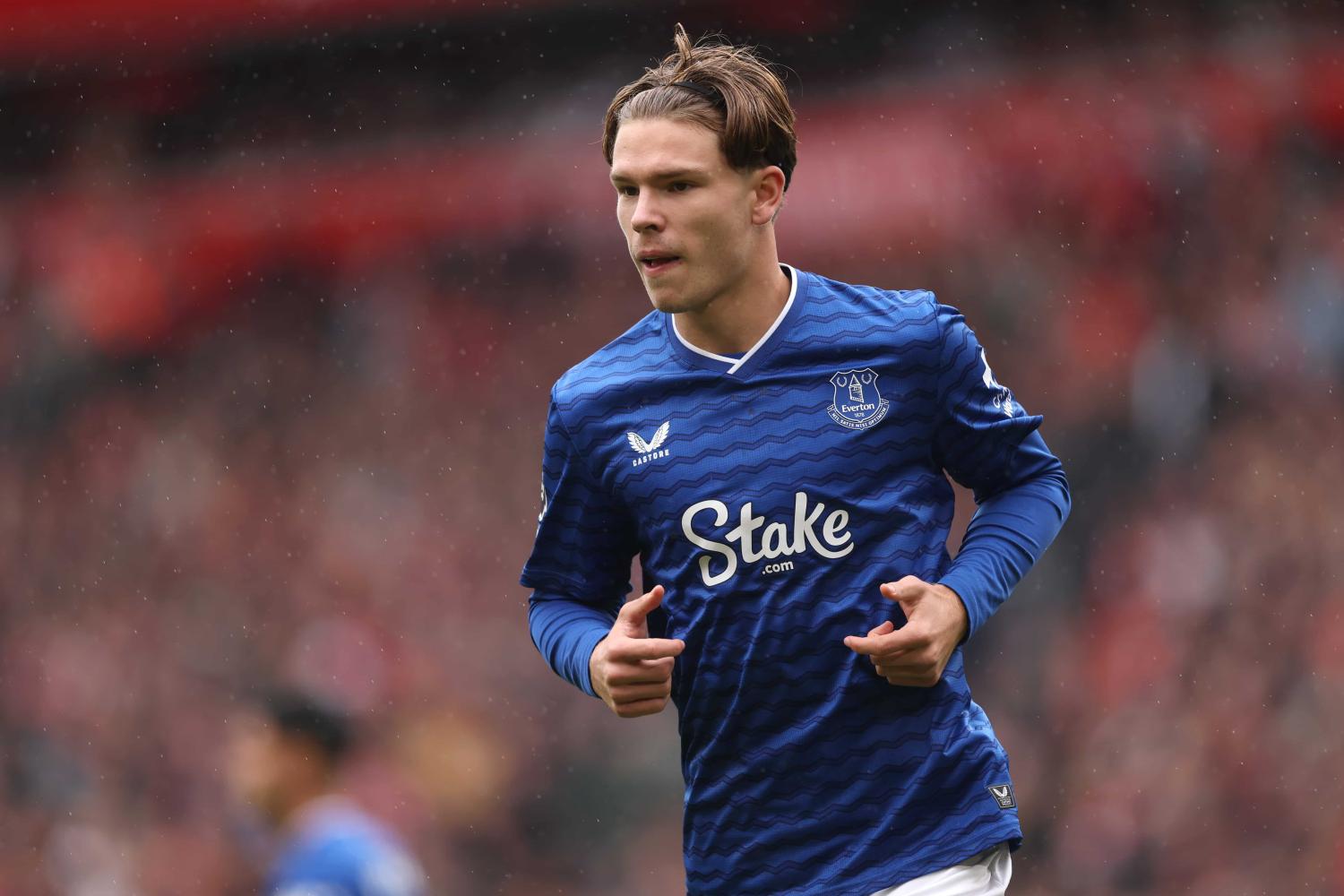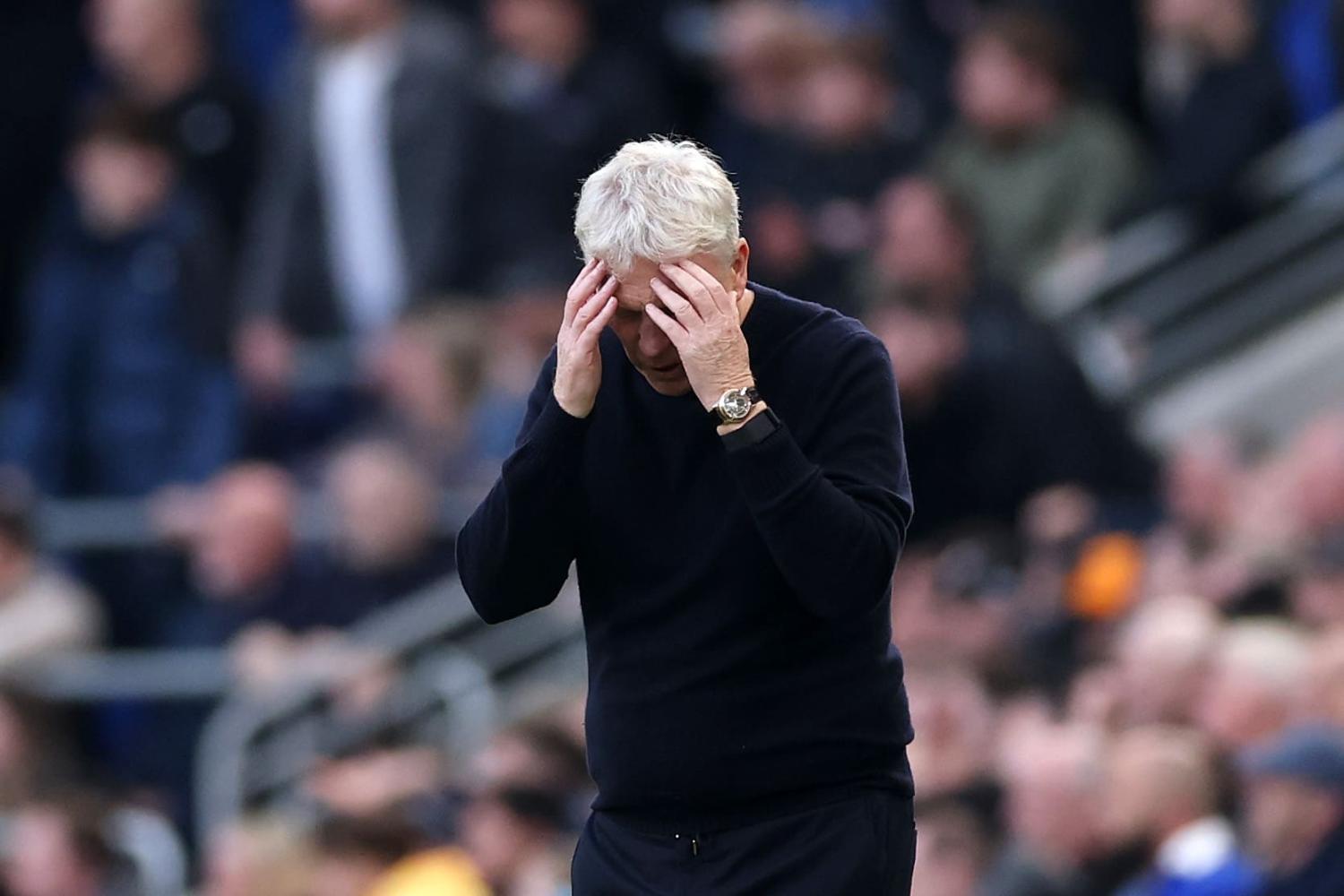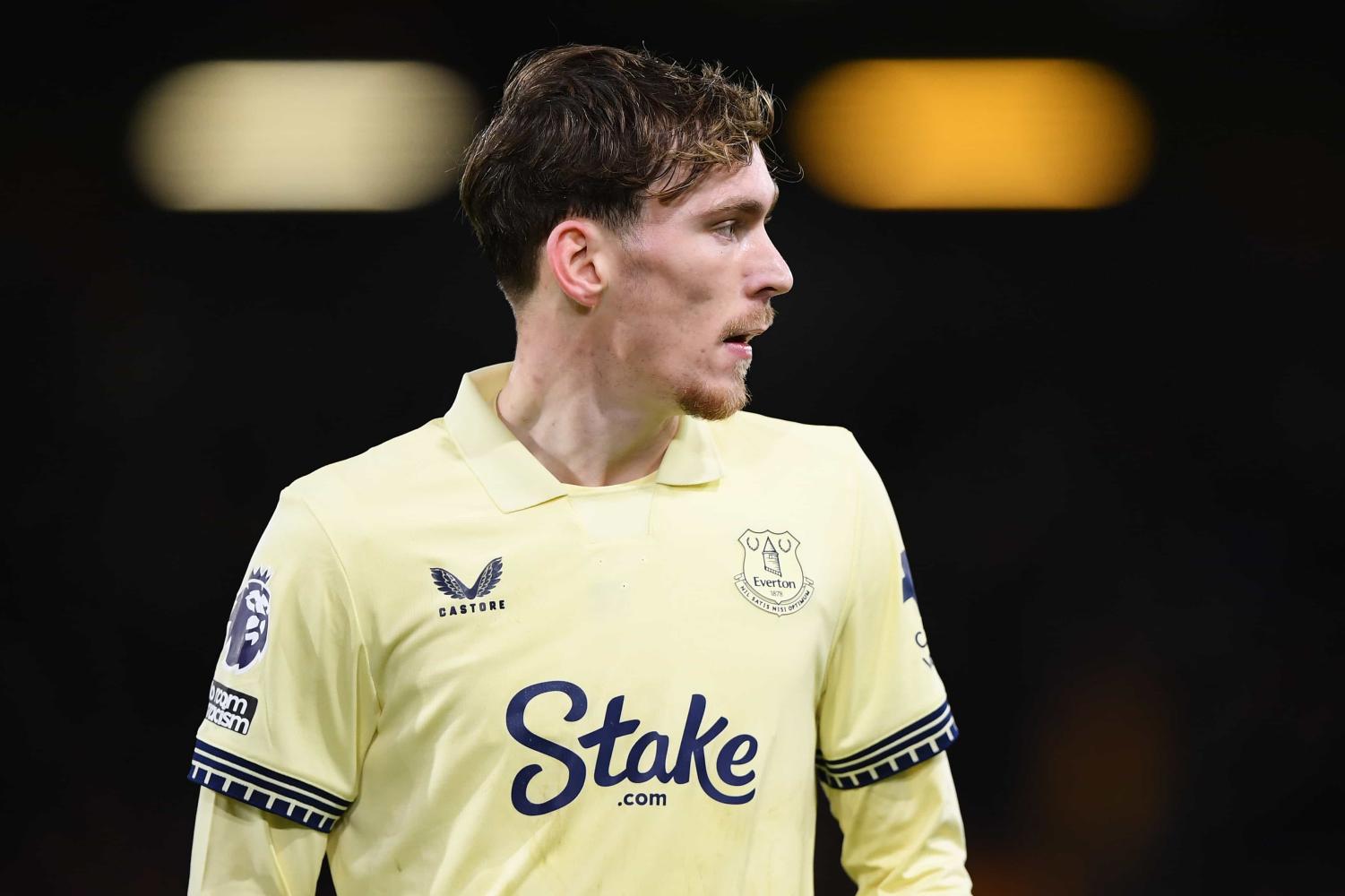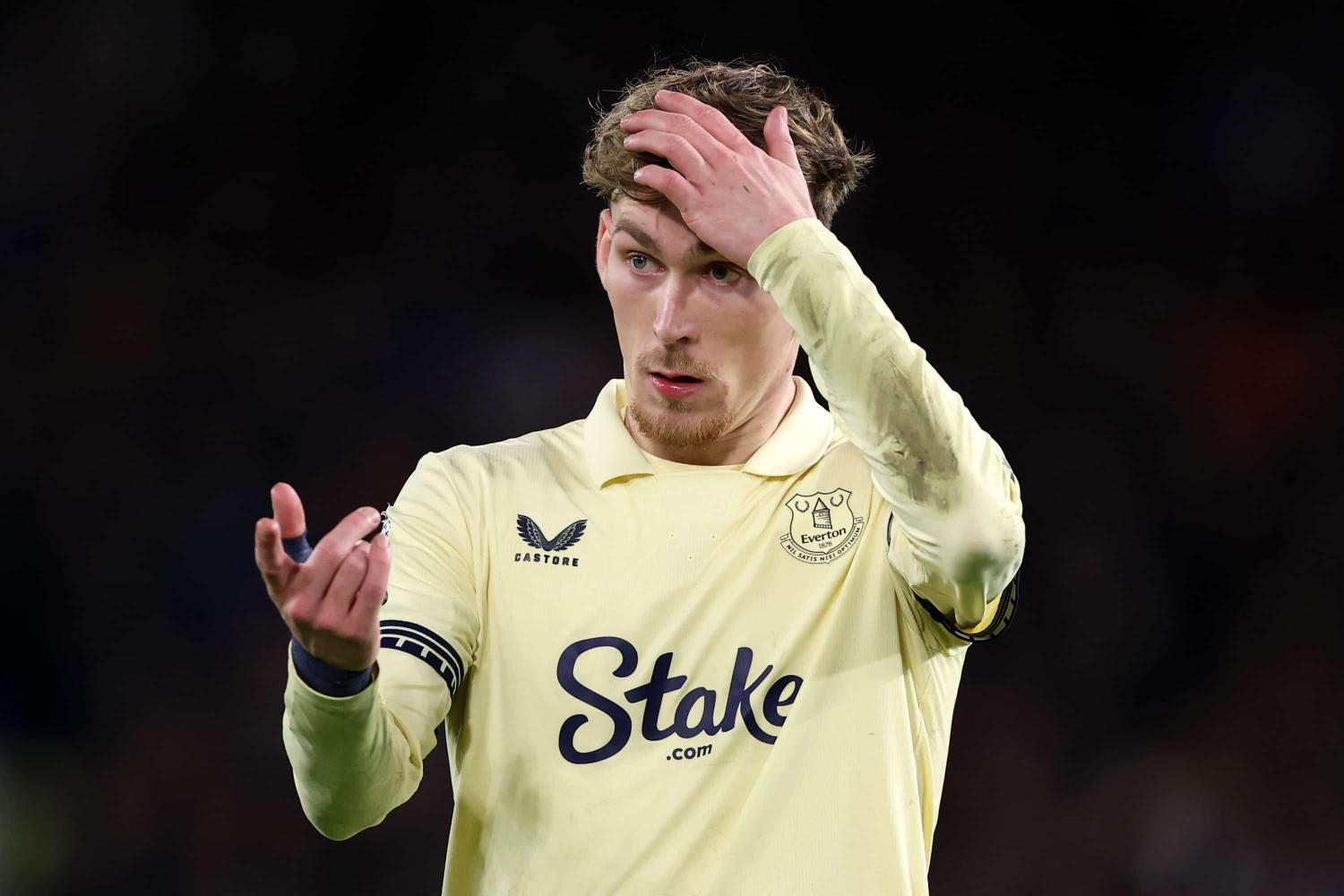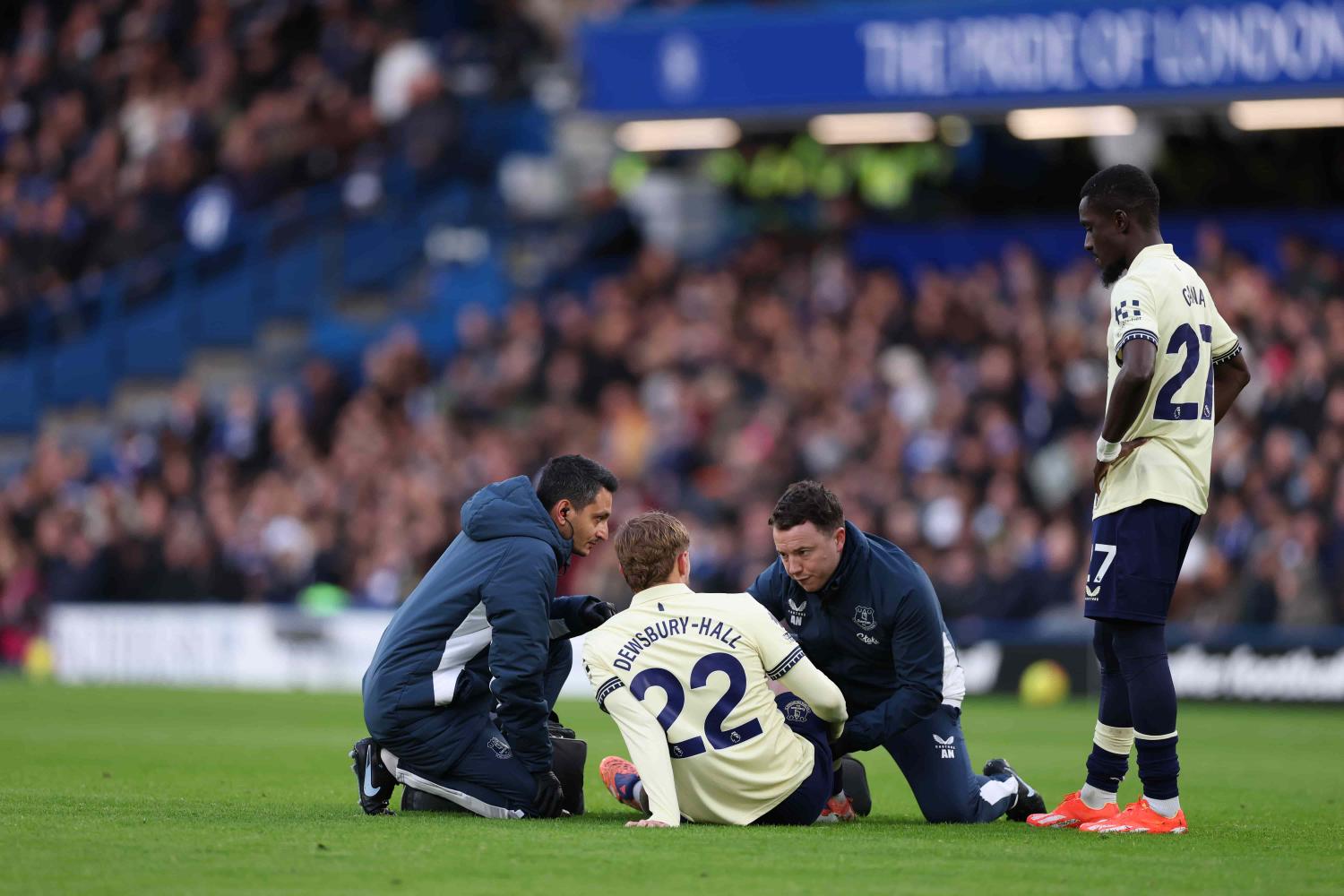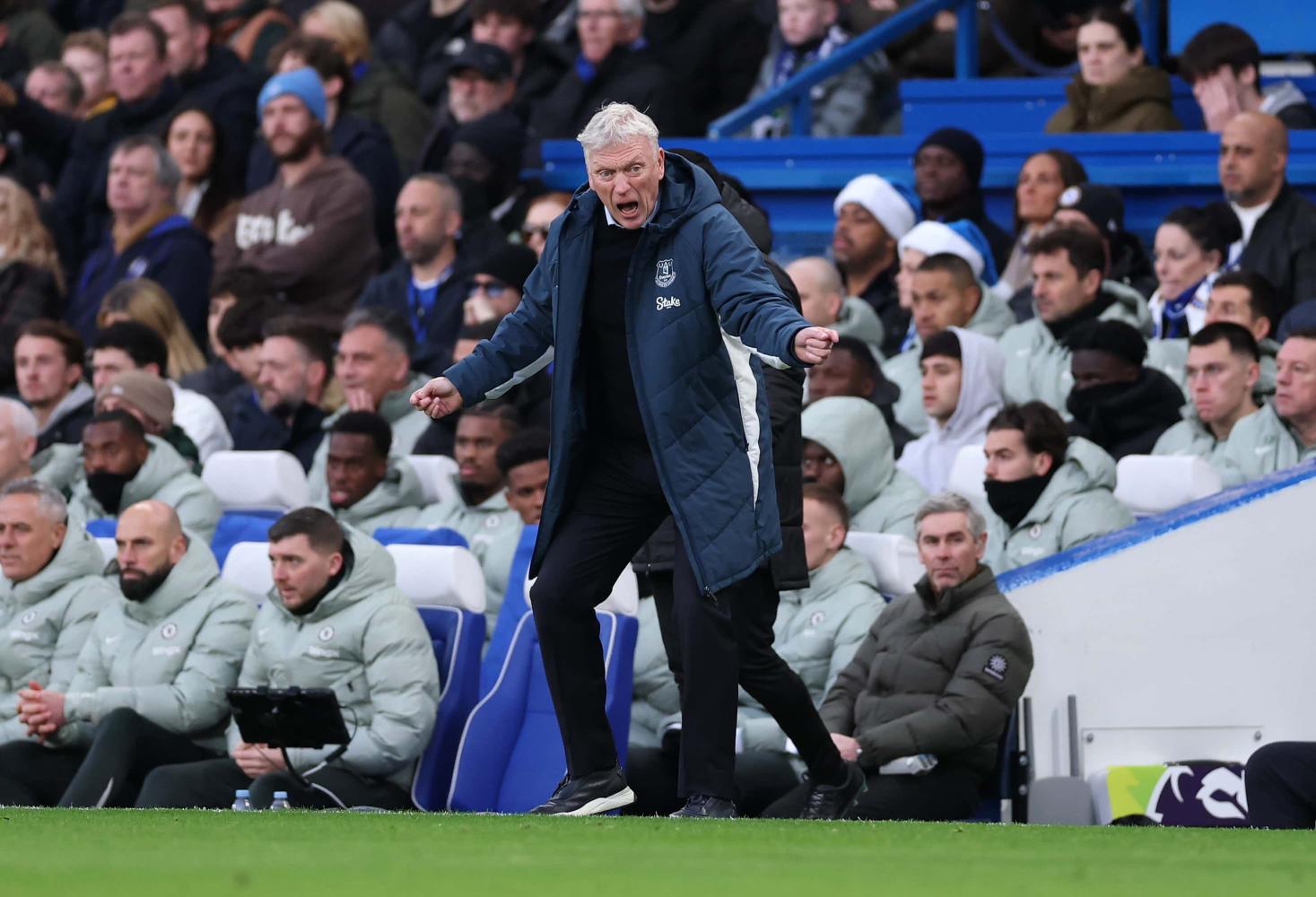
X: FEAR AND TREPIDATION (1997-2002)
 The
Poisoned Chalice The
Poisoned Chalice The Ferguson
Incident The Ferguson
Incident Kenwright Achieves
His Ultimate Dream Kenwright Achieves
His Ultimate Dream Smith Struggles to
Turn the Tide Smith Struggles to
Turn the TideTHE POISONED CHALICEThe speed with which Royle's reign went from triumph to tragedy, and the clash with Peter Johnson that precipitated his sudden departure from Everton on Transfer Deadline day in March 1997, served to illustrate just how difficult the task of managing Everton had become. On the back of almost a decade of decline since winning the League Championship in 1987, the Goodison manager's position had become a poisoned chalice and it wasn't immediately clear who was going to replace Royle.
Chairman Peter Johnson was convinced that the job was still a highly sought-after position and, after installing stalwart defender Dave Watson as caretaker manager until the end of the 1996-97 season, he made Bobby Robson his number one target. Robson, whose position at Barcelona had become ambiguous at best, was holding out hope that the Spaniards would retain his services. Although Johnson courted the former England boss throughout the summer, he chose to stay in Spain. With most of the close season gone by this stage and a slew of media-fuelled rumours involving the likes of Johann Cruyff, Gerard Houllier and Louis van Gaal consigned to the rubbish bin, Everton's options were few and far between, but former Goodison favourite Andy Gray emerged as a popular candidate. Far and away the most highly-regarded football pundit on British television, Gray had built a stellar career at Sky Sports on his unrivalled knowledge of the game and tactical acumen. However, although he interviewed for the Everton job at Johnson's Park Foods campus, the Scot eventually chose the comfort of Sky's studios and a vastly improved salary ahead of the huge responsibility of rescuing an ailing footballing giant. Whether Gray had talked up his desire to manage the club he represented so successfully in the 1984-85 season to wangle more money out of the Rupert Murdoch empire, or whether Johnson had misled the fans with more false promises was unclear, but a war of words erupted around the negotiations, damaging the club's fragile image still further. With anxiety among the fans escalating and Johnson becoming ever more desperate, a hero from the golden age of the mid-1980s once again stepped into the breach to save the club's blushes just as pre-season preparations got underway. At the end of June 1997, Howard Kendall took up the Everton reins once more for an ill-advised third term in the Goodison hot-seat, just four years after ending his second spell in charge by resigning from the post. Kendall was soon to discover that top-flight football had changed drastically from four years – even ten years – before. Everton's cash crisis, and the fact that he had inherited a team which had had a close call with relegation the season before, didn't help matters. From beginning to end, Kendall's Everton struggled painfully through the 1997-98 season. Rock bottom of the Premiership by the end of November, the Blues looked doomed, but a miraculous two-month spell during which they lost just once – to champions Manchester United – in nine games elevated Everton to 15th in the Premiership and on the road to apparent salvation. However, amid confusion over whether Chairman Johnson was withholding transfer funds from Kendall in the hope of replacing him in the summer, or whether the manager was merely choosing not to spend, the team's fortunes nose-dived. Between early February and the end of the season in May 1998, the Blues would win just two more games. By the final match of the 1997-98 campaign on 11 May, Everton occupied the third relegation spot and were once more on the brink of relegation to the Nationwide First Division.
With the other two demotion places already settled, it was a straight fight between Everton and Bolton Wanderers to see who would join Barnsley and Crystal Palace in Division One. Bolton were a point ahead of Everton but with an inferior goal difference, so Kendall's side knew they needed to get a better result on the day than Wanderers in order to stay up. Coventry City were the visitors to Goodison Park, while Bolton had to travel to Chelsea who were four days away from the European Cup Winners' Cup Final... There were doubts over just how motivated Gianluca Vialli's men would be for an unwanted final league match. While the preparations for Everton's previous last-day Houdini act in "that game" against Wimbledon four years before had been upbeat and positive, the match against Coventry carried an air of gloom and foreboding. Nevertheless, when the team took the field against Coventry, a packed stadium raised the roof in an effort to spur the Boys in Blue to victory. Within 7 minutes of kick off, Everton were 1-0 up, thanks to a goal that could only have come from the Good Lord himself; Gareth Farrelly despatched a left-foot rocket that flew into the net and sent the home faithful into ecstasy. With events at Stamford Bridge having such a bearing on the Blues' destiny, nerves plagued Everton despite the early goal, even after the crowd had erupted at the news that Vialli had scored for Chelsea. Nick Barmby's penalty miss five minutes from time and a subsequent equaliser for Coventry at the death sent the fans into panic at the implications of a Bolton equaliser but a second Chelsea goal late-on secured another unlikely Everton escape from the jaws of relegation. The club lived to fight another season among England's elite; Howard Kendall wasn't to be so lucky.
The over-riding sentiment following last-ditch salvation was "never again". However, as the close season wore on, it became increasingly obvious that Peter Johnson did not believe Kendall was the man to improve the situation. As rumours grew in tandem with intense media speculation that Howard was about to lose his job, Johnson cruelly kept his manager dangling before eventually forcing him out of the club at the end of June 1998. As the supporters geared themselves up for another embarrassing hunt for a manager and the likes of Peter Reid, Martin O'Neill, and even Jurgen Klinsmann were bandied about in the press, Johnson pulled the irons out of the fire by stealing ex-Rangers manager Walter Smith from under the noses of Sheffield Wednesday. The acquisition of one of Britain's most successful and highly regarded managers – he had overseen a decade of dominance by Rangers over the Scottish Premier League – was seen as quite a coup and Smith was installed as Kendall's successor within just 5 days of the latter's dismissal. Once again, there was new hope of a return to the "big time" for Everton's long-suffering fans whose anger at the treatment of Kendall was tempered by optimism pervading the dawn of the Smith era.
There had been no shortage of transfer activity during Howard Kendall's brief third spell as Everton boss, but the 1997-98 season saw a number of mediocre players – befitting the downtrodden stature of the club – enter the Goodison stage. Players who had taken the club to the brink of UEFA Cup qualification in 1996 – names such as Speed, Hinchcliffe, Stuart, Kanchelskis, Barrett and the legend himself, Neville Southall – had all moved on to pastures new... to be replaced by unproven Premiership players such as Thomas Myhre, Don Hutchison, Mitch Ward, Carl Tiler, Mickael Madar and John Spencer. While those signings suggested a meagre transfer kitty for the new manager, Johnson assured Smith that there would be plenty of money available. Hopes were high with the fans and season ticket sales soared past the 20,000 mark. Names such as Davor Suker and Mario Stanic were linked with moves to Goodison but it was John Collins who arrived first for £2.5M from Monaco. Known as a tidy midfielder with a sweet left foot, Evertonians quickly adopted Collins as a fans' favourite; he was followed by French midfielder Olivier Dacourt for £4.5M and stylish Italian defender Marco Materazzi, who would later become a full international. The two came relatively unknown but held the potential to become Goodison legends. With the further additions of Steve Simonsen (at £3.3M, a record for a goalkeeper) and Ivorian striker Ibrahima Bakayoko by October, Smith took his spending total to a whopping £20M. Despite the introduction of some impressive-looking players, Everton struggled to find any kind of momentum. However, with the narrow escape from the drop fresh in the memory, fans seemed content with mid-table mediocrity for the time being. But the season exploded in late November when, without warning, fan favourite Duncan Ferguson was abruptly sold to Newcastle United, apparently without Walter Smith's knowledge.
While the two teams were playing in front of the Sky Sports cameras on a Monday night, the respective chairmen were hammering out an £8M deal that would take Ferguson to Ruud Gullit's Newcastle. Reports of a distraught Ferguson confronting an incredulous Smith as he made his way out of the stadium filtered out and there was outrage among the supporters. This was compounded by the revelation that, instead of coming from Johnson's pocket, the £20M spent on new players had been drawn straight from the club's overdraft. Everton were now deep in the red and the most highly-regarded of their players had been sold to appease the club's bankers who were threatening foreclosure if they didn't get something soon. Ironically, Ferguson was off-loaded by Johnson at a time when his stock with the supporters was at an all time low. Indifferent form and the negative effect his height had on the way the team played, coupled with his refusal to take a penalty as Everton crashed out of the League Cup to First Division Sunderland following a penalty shoot-out, had led to much criticism of the Goodison "talisman". However, it was the manner in which the chairman pulled the rug from underneath his manager that angered the fans more than the departure of Ferguson itself. It was the wrath of the supporters, combined with Smith's furious threat to quit if Johnson didn't resign as Chairman of the club, that finally saw Johnson's calamitous tenure come to a welcome end. By the end of the month, Johnson had announced his decision to relinquish control and step down.
The prospect of finally seeing the back of "Agent Johnson" – Peter Johnson was once a season-ticket carrying Liverpool fan – and the resolution of the dilemma over Duncan Ferguson engendered a whole new atmosphere at the club. With Ferguson's "target man" presence now gone, the team was forced to play football on the ground and young striker Danny Cadamarteri reaped the benefits in the first game of the post-Dunc era as he scored both in goals in the Blues 2-1 win at Charlton. Still, Smith's side were frustratingly erratic and the 11th-place berth they achieved as a result of the opening day goalless draw with Aston Villa was as high as Everton ever got that season. While their exploits in the FA Cup offered hope, the Blues' up-and-down league form kept them hovering above the relegation zone. After crashing out of Cup at the Quarter Final stage in a 4-1 defeat by Newcastle, four straight defeats – culminating in a 2-1 home defeat by Sheffield Wednesday during which Materazzi gifted the visitors two goals with identical mistakes – dumped the club into the drop zone. Another desperate scrap to avoid demotion looked on the cards.
Enter Kevin Campbell. Signed on loan from Trabsonspor after the Turkish club's president had belittled him in the press with racial abuse and attacks on his ability, the former Nottingham Forest and Arsenal striker's arrival was greeted with apathy by the Everton faithful. His first two performances did little to inspire confidence but a must-win game at home to Coventry launched Campbell's Everton career and sparked an impressive reversal in the team's fortunes. Campbell scored twice in that match as the Blues won 2-0; twice in the next game – a 3-1 win at Newcastle – and twice more in the game after that as Smith's men trounced Charlton 4-1. In a devastating partnership with 18-year-old starlet Francis Jeffers, Campbell notched nine goals in five games and catapulted Everton away from relegation danger. The Blues finished the season in 14th place and optimism was, once more, in the air. Following protracted negotiations with Trabsonspor, Kevin Campbell was eventually signed permanently for £3M, but Smith was forced to admit defeat where Dacourt, Materazzi and Bakayoko were concerned; all three were off-loaded in the summer for handsome sums of money, but Smith saw none of the proceeds as it was ploughed into the bank to stem a rapidly rising overdraft. Although financial constraints restricted Smith to more modest purchases in the 1999 close season – Campbell, Mark Pembridge, Abel Xavier and American striker Joe-Max Moore all arrived for a gross outlay of £5.3M – there were high hopes that the new season would see Everton challenging in the top half of the table once more. The 1999-2000 season was to be Walter Smith's most successful season in charge of Everton. Thanks largely to the form of Campbell, Jeffers and Nick Barmby, his side reached the dizzying heights of 6th place on three separate occasions during the season. The game of the season was the 5-0 trouncing of Peter Reid's Sunderland on Boxing Day, but key injuries to the former two strikers disrupted the team's flow and the Blues ultimately finished a disappointing 13th thanks to a dismal slump in form going into the "home straight". An embarrassing League Cup 2nd Round exit at the hands of lowly Oxford United was tempered somewhat by another run to the Quarter Finals in the FA Cup, but the fans put their hope in Campbell and Jeffers staying fit in 2000-01 so that the team could finally launch a sustained challenge for Europe. Those hopes were fuelled by the long-awaited resolution of Bill Kenwright's bid to buy out Peter Johnson's stake in Everton Football Club. Having initially asked a ludicrous £70M for his 68% stake in the club, Johnson was eventually forced to sell for £21M, a sum that Kenwright and his True Blue Holdings consortium was barely able to raise. Kenwright lost a bidding war to Johnson for control of Everton in 1994 but in January 2000 he proudly announced the successful conclusion of his bid to buy the club he has supported since childhood, putting a True Blue Evertonian at the Goodison helm, albeit as vice-chairman. And it didn't take long for the new chairman and new director Paul Gregg, then head of the European arm of US entertainment giant, SFX (later renamed Clear Channel), to draw up ambitious plans for a new state-of-the-art stadium for the club. Peter Johnson's chairmanship had been plagued by a badly managed and poorly staged bid to relocate Everton to a new ground in Kirkby or Cronton Colliery, but Kenwright's proposal for a new home on the banks of the Mersey at the much-coveted Kings Dock site received wide support from the fanbase. In fact, the Kings Dock bid eclipsed its five competitor proposals to win "preferred bidder" status from Liverpool Vision who, in conjunction with English Partnerships, were in charge of allocating the land for development. Compared to the public relations disasters that were synonymous with the Johnson era, the stunning Kings Dock proposal was a welcome change for a club who, by this stage, only made the news for its prowess in the relegation dogfight each season. Indeed, hopes that the club could match the ambition shown off the field with improvements on the field further fuelled optimism for the 2000-01 season, but those hopes were rewarded with an injury crisis not seen since the winter of 1996-97, which had so emphatically derailed Joe Royle's tenure. With Campbell set to miss the start of the new season because of surgery, Walter Smith made the dubious decision to re-sign Duncan Ferguson – a player with one of the worst injury records around – as cover. Much was made of whether this was an act of sentimentality on the part of Kenwright (who perhaps wanted to right the wrong committed by Johnson two years previously), but at the time the wisdom of the decision was sternly questioned. Ferguson's lengthy absence that season through injury only served to confirm the doubts.
Despite a promising start, the Blues spent the majority of the new campaign languishing in the bottom third of the table, eventually finishing 16th. For the first time, probing questions were being raised about the suitability of Walter Smith for the job of trying to return Everton to the right end of the Premiership. Serious tactical flaws were compounded by a seeming lack of man-management skills on the part of Smith and his assistant, Archie Knox (as evidenced perhaps by Francis Jeffers's shock decision to hand in a transfer request on the eve of the campaign, not to mention allegations of a punch-up between Knox and midfielder Stephen Hughes). An over-reliance on over-the-hill journeymen had the supporters wondering how much longer they would have to suffer through interminably dull performances on the field before things got better. The 2001 close season was dominated by the controversies surrounding Francis Jeffers and fellow starlet, Michael Ball. Jeffers had made known his desire to leave Goodison Park as early as January that year but more surprising was Ball's decision not to sign a new contract – despite his well-publicised love for the club. Whether their decisions were based on greed on the part of the players or a lack of faith in the manager, the loss of two young, Blue-blooded stars was a bitter pill for fans to swallow. One consolation, however, was both players' injury problems; Jeffers and Ball hardly figured at all for their respective new clubs, Arsenal and Rangers, that season, perhaps vindicating the decision to allow them both to leave. The combined influx of some £14M for the pair also helped! With a severe lack of transfer funds still hindering Smith's attempts to rebuild his squad, just two players arrived in the summer of 2001. Boyhood Blue, Alan Stubbs, was signed on a free transfer under the Bosman ruling from Celtic and, following a niggly wrangle with Belgian side Anderlecht over the final fee, Tomasz Radzinski arrived as Jeffers's replacement for £4.5M. With most of the long-term injury victims now back to something resembling full fitness, the 2001-02 campaign was seen as make or break for Walter Smith who was about to start his fourth season in charge at Everton. When, by the end of August (following a win over Middlesbrough), Everton were top of the Premiership after three games, Smith seemed to have finally found the formula for success at Goodison. Although Radzinski suffered a pre-season injury and wasn't able to make his debut until the end of September, the Blues' boss had the rare luxury of being able to field both Campbell and Ferguson in the same line-up and 7 points from 9 had given Everton a great start to the season.
However, miserable performances against Manchester United and Liverpool in September 2001, combined with another embarrassing 2nd Round exit in the League Cup to lower division opposition (this time Crystal Palace), signalled that the club was facing another difficult season after all. Another catalogue of injuries that decimated the forward line heralded a collapse in December, with Smith's side losing five straight league games and slipping from 9th to 13th, rapidly eroding any cushion they had built between themselves and the bottom 6 places in the Premiership. Between mid-December and mid-March, Everton won just two Premiership matches and eventually tumbled out of the FA Cup at the Quarter Final stage with an utterly dreadful performance in 3-0 defeat at Middlesbrough. Coming on the back of an equally inept league defeat at West Ham 4 days before, it was the last straw for Bill Kenwright who finally took the bold decision of dismissing his close friend Walter Smith on 12 March 2002. Ironically, with advice from Smith himself, Kenwright immediately singled out the highly sought-after Preston manager, David Moyes, and within 48 hours had signed his man. The 38-year-old Moyes, who had been linked with Manchester United and West Ham, was overjoyed at the prospect of managing what he saw as a huge club, although he certainly did not underestimate either the long-term struggle or the short-term task of avoiding relegation with just nine games left. For Smith, it was a disappointing end to a position that promised so much and one that he always vowed would be his last, such was his optimism that he could bring success back to Goodison Park. Misled by Johnson in his first season and forced to work within a incredibly tight budget thereafter, he left Everton with a legacy of having a great eye for a good signing but sorely lacking the man-management skills and tactical nouse needed to create a winning formula at this level. Walter Smith had finally been found out. |
|||||||||||||||
| « A Royle Era | Bibliography » |
| History | F I II III IV V VI VII VIII IX X B | Fear and Trepidation |


